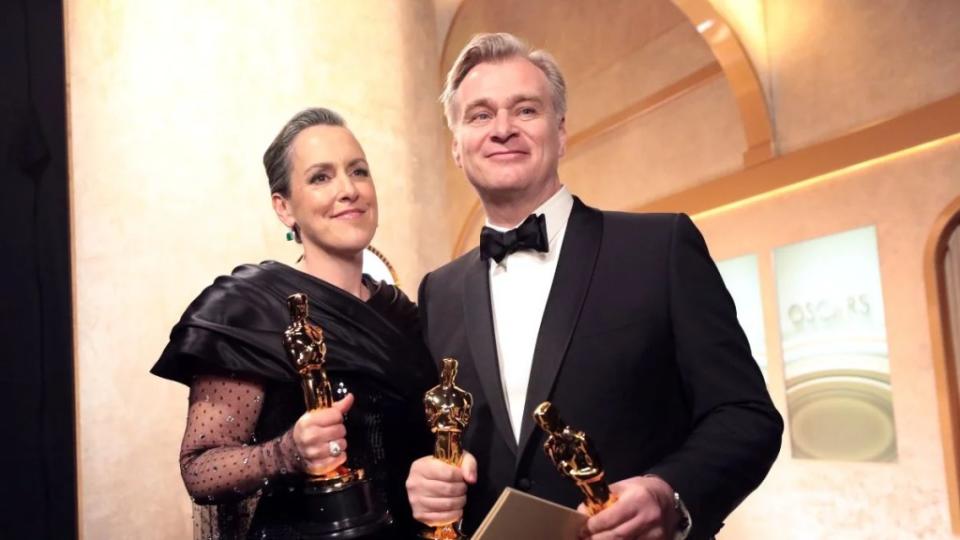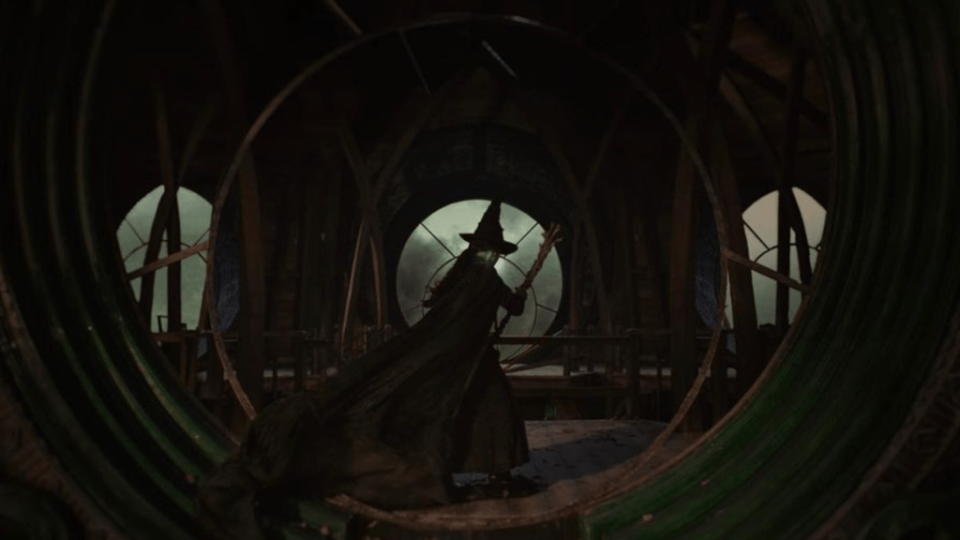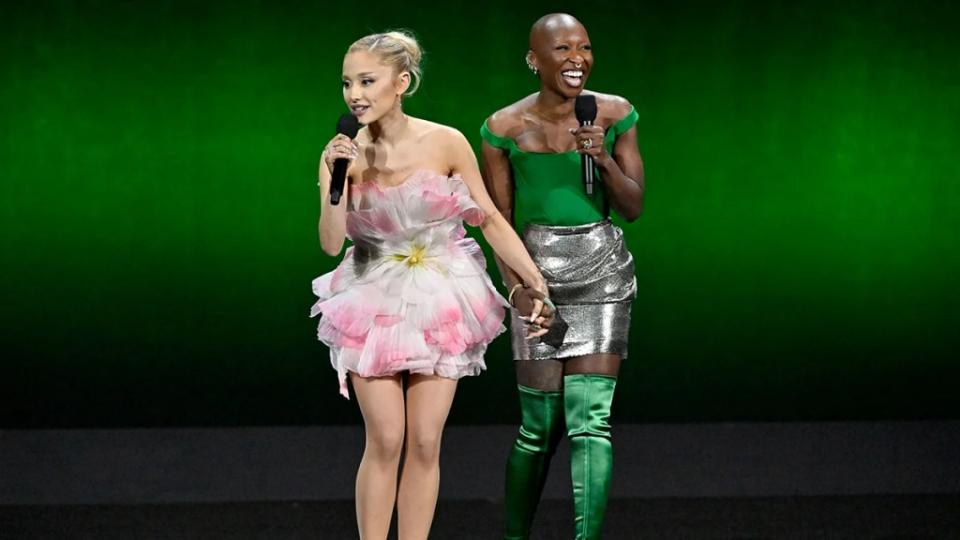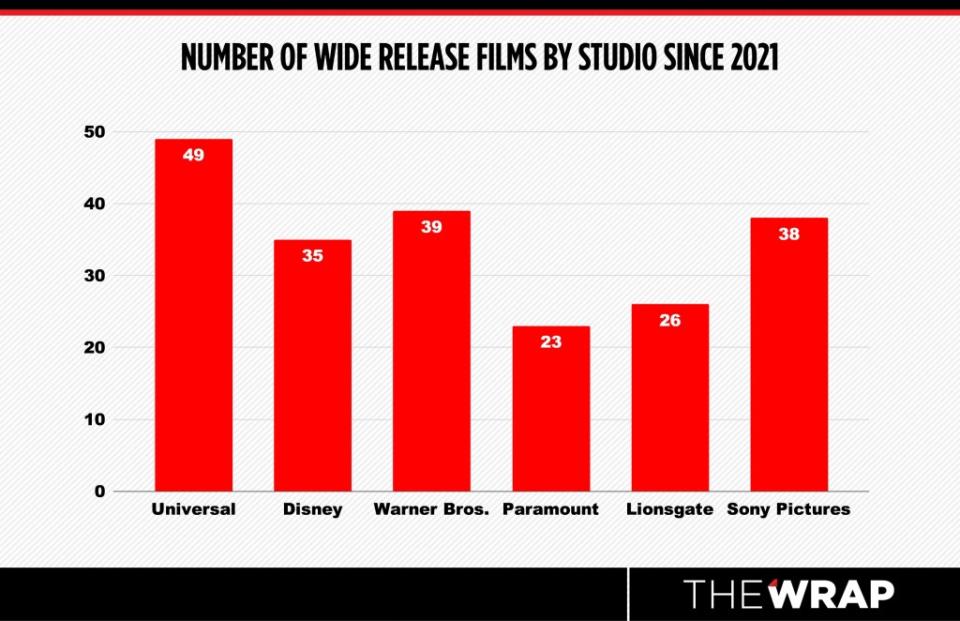Inside Universal’s Potent Recipe for Success in a Struggling Movie Business
At the upscale sushi spot Nobu, Donna Langley sat at a corner table away from the crowd at Universal Pictures’ CinemaCon party in Las Vegas last month. On the opposite side of the room, filmmaker Jon M. Chu enjoyed salmon nigiri with Ariana Grande and Cynthia Erivo, the stars of his upcoming film “Wicked” — just minutes after they wowed theater owners with a preview of a movie that could become a massive Thanksgiving box office hit.
If it does, it will continue a huge hot streak for Universal, one that hit its peak for Langley when Christopher Nolan’s “Oppenheimer” became the 10th film in the studio’s history to win the Oscar for Best Picture. The film was the studio’s first since 1993 to win seven Oscars overall, and the highest grossing Best Picture winner from any studio in the last two decades.
“As [‘Oppenheimer’ producer] Emma Thomas said onstage, you dream of that moment, you dream of that night,” said Langley, who is the softspoken chairwoman of NBCUniversal Studio Group and Chief Content Officer. She allowed herself a brief moment of pride: “It was the most successful film this studio has had at the Oscars since ‘Schindler’s List,’ and to have a film that we wanted to be a part of for so long get so much recognition was a truly special moment.”

It was a special moment in a special year for Universal — even amidst so much uncertainty for Hollywood at large. At a time when labor disputes, falling stock prices and lower content spending have left the entertainment industry in a period of deep instability, Universal may be the studio best positioned to navigate it — despite lacking its own version of franchise-making Marvel Studios.
That is thanks to the stable of production partners it has assembled, alongside relationships with several top filmmakers like Christopher Nolan, Jordan Peele and David Leitch, the latter of whom directed Universal’s next film, “The Fall Guy,” which comes out this weekend in the plum release slot that has historically belonged to Marvel.
Without a big IP acquisition that was obvious after Marvel and Lucasfilm were acquired by Disney, investing in filmmakers and filmmaking talent was the way to go.”
Universal Studios Chairman Donna Langley
And then there is Langley, a 23-year Universal veteran who has held together a core executive team with decades of experience whose stability stands in stark contrast to rival Warner Bros., which has gone through two mergers in the past six years; and Paramount, which just lost its latest CEO this week.
Her tenure has resulted in four years of record global growth for Universal studios and two of the most profitable years in the studio’s 107-year history, according to the company. For the past two years, Universal has led the box office in domestic market share, racking up a combined $3.36 billion in domestic grosses and releasing an industry-leading 55 films around the world.
Abhijay Prakash, who was Universal’s Filmed Entertainment Group president under Langley prior to joining Blumhouse in the same role in 2022, said Langley had a rare combination of strong talent relationships with an understanding of the shifting business.
“To succeed, it’s about relationships with talent and the material you’re producing; a strong comprehension of the business model; and an understanding of the marketplace you’re putting it in,” Prakash said in an interview. “Donna has such a great command of all three, and it’s something that I’ve seen her maintain on both sides of the Universal/Blumhouse partnership even as the market has changed.”
From “Despicable Me” to “Oppenheimer”
The roots of Universal’s current success can be traced to 2007, when former 20th Century Fox Animation President Chris Meledandri founded Illumination Entertainment and signed a distribution deal with Universal that began with the studio’s 2010 smash debut hit “Despicable Me.” A year later, Universal released “Fast Five,” a film that introduced Dwayne Johnson at the height of his Hollywood popularity to the “Fast & Furious” series and transformed that franchise into a tentpole behemoth that became the studio’s top moneymaker through the 2010s.
While “F&F” reeled in the big bucks, Universal expanded its partnerships under Langley, who was promoted to chairman in 2013 after first joining the studio as production SVP 12 years prior. She signed Blumhouse, the kings of modern horror under mega-producer Jason Blum, to a first-look distribution deal in 2014. Universal acquired DreamWorks Animation in 2016. Then Peele, after the runaway success of his debut film “Get Out,” signed an exclusive deal in 2019 with Universal for his production label, Monkeypaw — the same year that David Leitch and his producing partner Kelly McCormick signed a first-look for their label, 87North.


In 2021, amid all that change, Universal made the hottest free-agent signing in Hollywood by bringing Nolan and “Oppenheimer” onto their slate. Nolan agreed to demands that included a combined $200 million in production and marketing spend and a three-week gap before and after the film’s July 21 release date.
With the exception of the acquisition of the IP-loaded DreamWorks, these key agreements were made with production companies defined by founders with distinctive creative visions like Peele and Leitch. Even Blum, who is a producer rather than a director, has established himself in Hollywood through his keen eye for high concept horror projects that can be made on a small budget and spawn sequels such as “The Purge” and “M3GAN.”
It’s not a unique strategy. Hollywood has always been built on relationships, and other studios have built up more than their fair share of them with filmmakers. But Universal has proven itself particularly adept at it, creating a slate-building strategy akin to building a portfolio.
“It was really born out of necessity,” Langley said of the strategy. “At the time I became chair, we had some strong IP with ‘Fast & Furious,’ ‘Jurassic’ and were already seeing Chris Meledandri’s franchise impact with Illumination. But without a big IP acquisition that was obvious after Marvel and Lucasfilm were acquired by Disney, investing in filmmakers and filmmaking talent was the way to go.”
Rare Hollywood financial stability
That portfolio-building came with the support of Universal’s parent company Comcast, whose financial stability has become a rare commodity in Hollywood at a time when other major studios have become either players or pieces in the game of consolidation that is still being played. Several of those competitors have also seen major elements of their IP stables falter at the box office.
Warner Bros., for example, has been on a box office hot streak for the past nine months but is only now starting to emerge from its merger with Warner Bros. Discovery and is still in the midst of rebooting its DC Comics franchise after a year of flops like “The Flash.” Disney, while still a multibillion-dollar pillar of the global box office, is no longer firing on all cylinders as it did five years ago and is in the midst of determining Bob Iger’s successor as CEO. And then there’s Paramount, whose film division is pressing forward after a resurgent 2022 amid a turbulent search for new ownership that has drawn the ire of shareholders, and the recent exit of CEO Bob Bakish.
Universal has had its own leadership turnover in recent years — marketing exec Josh Goldstine was fired in 2018 and NBCUniversal CEO Jeff Shell departed last year following misconduct inquiries. But the core leadership assembled by Langley — including NBCU global distribution chairman Peter Levinsohn, business affairs & operations vice chairman Jimmy Horowitz and Universal Pictures president Peter Cramer — has remained largely intact.
Langley, 56, is an unusual Hollywood transplant. Born in London and raised by an adoptive family on the Isle of Wight, she is also a Dame Commander of the Order of the British Empire (DBE), so named in 2020 for her services in film and entertainment.
With stability in hand, Universal has continued its track record of box office consistency. Along with the success of “Oppenheimer,” Illumination has cracked the year-end top five twice with “Minions: The Rise of Gru” in 2022 and “The Super Mario Bros. Movie” in 2023. The “Jurassic World” series got its third straight $1 billion hit with the 2022 threequel “Dominion,” and now a fourth film has been greenlit.
Not all of them have worked, of course. Like its competitors, Universal has seen its fair share of flops like DreamWorks’ “Ruby Gillman: Teenage Kraken,” Billy Eichner’s LGBT romcom “Bros,” and most notably, last fall’s “The Exorcist: Believer,” which failed to start a new revival trilogy after Universal paid a hefty sum for the rights to the classic horror IP. More recently, the vampire film “Abigail” hasn’t drawn much blood with $28.5 million grossed worldwide after two weekends in theaters, a total that matches its reported production budget.
Those misfires have been balanced by films that don’t have that level of chart-topping success, but have a high return on investment against their smaller budgets. Blumhouse has done that for years and continues to do so with recent fright flicks like “The Black Phone,” “M3GAN,” and the video game adaptation “Five Nights at Freddy’s” — the biggest hit in studio history.
DreamWorks found a hit in the shadow of “Avatar: The Way of Water” with its own sequel, “Puss in Boots: The Last Wish,” and the studio even scored a win in the seemingly dormant romcom genre with “Ticket to Paradise” starring George Clooney and Julia Roberts.
That variety has allowed Universal to avoid relying on a single franchise like “Fast & Furious” to hold up its annual box office. Last year’s penultimate installment “Fast X” grossed $704 million worldwide against a pandemic-inflated $340 million budget, but the success of “Super Mario Bros.” ($1.36 billion worldwide) and “Oppenheimer” ($972 million) helped take the pressure off of that long-running franchise to perform at the level of past installments like “Furious 7,” which made $1.5 billion in 2015.
Worldwide, Universal has amassed $8.8 billion at the box office in the past two years, with the $4.91 billion in 2023 leading all studios. At a time when movie theaters have been calling for more movies to screen, Universal has been leading the charge, making historic windowing deals with the top theater chains and releasing more films than any other studio.

“It’s not just about the big, four-quadrant films,” Langley said. “We wanted to cover as many parts of the global audience as we can with a variety of films that speak to them, and we’re doing that by investing in filmmakers who understand different parts of that audience. Ten years ago, we didn’t have as much IP as some other studios, but we knew we could eventize films that didn’t obviously seem like a traditional ‘event’ release. We knew we could tailor films to niche audiences because we treat them like the general audience.”
That marketing prowess, led by veteran marketing chief Michael Moses, helped make “Despicable Me” into a Minion merch-selling behemoth, turned “M3GAN” into a Tiktok sensation and made a grim three-hour drama about the creation of the atomic bomb into a global phenomenon.
Can Langley and Universal extend the hot streak?
That ability to turn films into events will once again be put to the test this summer.
“Despicable Me 4,” will contend for the title of the season’s highest-grossing film. But the summer will kick off with “The Fall Guy,” a crowd-pleasing, car-smashing, explosion-filled ode to stuntmen that heads into theaters with favorable reviews and a steep $125 million production spend. While it’s based on a 1980s ABC TV series starring Lee Majors, it’s really selling itself not based on something people already know but on the star power of Ryan Gosling — the way Hollywood used to work.

But can it still? Box office tracking currently predicts a mere $30 million opening for the film, meaning that word-of-mouth is going to have to really kick in for the film to be successful against IP-supported competition like Disney/20th Century’s “Kingdom of the Planet of the Apes” and Warner Bros./Village Roadshow’s “Mad Max” spinoff “Furiosa.”
Universal is also dropping big bucks on “Twisters,” an indirect sequel to “Twister,” the 1996 Bill Paxton/Helen Hunt tornado film that came out at a time when the advent of computer visual effects gave Hollywood the chance to sell audiences on the chance to see disaster films as they had never seen them before.
Now, with this follow-up led by “Anyone But You” star Glen Powell, Universal is banking that seeing terrifying storms on the big screen will prove to be just as timeless and that “Twisters” can stand as a PG-13 blockbuster alternative to gory R-rated competitors like the highly anticipated “Deadpool & Wolverine,” and “Borderlands” and “Alien: Romulus,” which come out in August.
If those films can find a foothold this summer along with “Despicable Me,” Universal will have plenty of momentum heading into the fall, when “Wicked” will try to revive the Thanksgiving box office after two years of poor returns for exhibitors during the holiday period. Jim Orr, Universal’s head of domestic distribution, is confident it can be done.
“Like every studio, we have to deal with the fact that there are only 52 weekends on the calendar, but what I’m particularly proud of about our team here is that we’ve been able to find corridors for box office success in places that aren’t always obvious,” Orr told TheWrap. “I firmly believe that if you wanted to build a studio from the ground up starting today, with so much uncertainty over where our industry is headed, Universal is the model you should follow.”
The post Inside Universal’s Potent Recipe for Success in a Struggling Movie Business appeared first on TheWrap.


